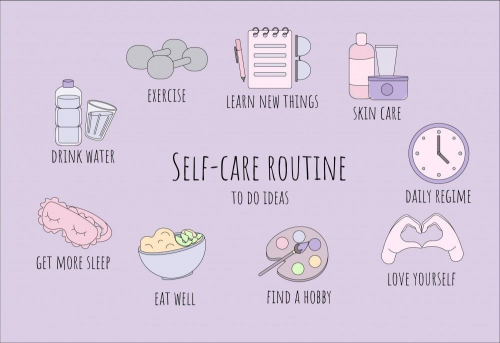“Top Self-Care Practices for a Healthier and Happier You
Related Articles Top Self-Care Practices for a Healthier and Happier You
- Quick Editorial Look: A Guide To Speed And Quality
- Elegant Fashion Week
- The Ultimate Guide To Building Your Basic Capsule Wardrobe
- Best Beauty Tips For A Radiant You
- The Ultimate Guide To Makeup Routines: From Beginner To Pro
Introduction
We’re thrilled to take a closer look at an engaging topic related to Top Self-Care Practices for a Healthier and Happier You. Join us as we weave together valuable insights and fresh perspectives to bring a new dimension to your understanding.
Table of Content
Top Self-Care Practices for a Healthier and Happier You

In today’s fast-paced world, it’s easy to get caught up in the whirlwind of responsibilities and forget about ourselves. We often prioritize work, family, and other commitments, leaving little time for self-care. However, self-care isn’t a luxury; it’s a necessity. It’s about nurturing our physical, mental, and emotional well-being, allowing us to thrive and live a more fulfilling life. Neglecting self-care can lead to burnout, stress, anxiety, and various health problems. Prioritizing self-care, on the other hand, can significantly improve our overall health and happiness.
This article explores a comprehensive range of self-care practices, categorized for clarity and effectiveness. We will delve into practical strategies you can incorporate into your daily routine to cultivate a healthier and happier you.
I. Physical Self-Care: Nourishing Your Body
Physical self-care focuses on the basic needs of our bodies. It’s about providing the nourishment and care required for optimal functioning. This includes:
-
A. Nutrition: What we eat directly impacts our energy levels, mood, and overall health. Prioritize a balanced diet rich in fruits, vegetables, whole grains, and lean protein. Limit processed foods, sugary drinks, and excessive caffeine. Pay attention to portion sizes and stay hydrated by drinking plenty of water throughout the day. Consider consulting a nutritionist for personalized dietary advice.
-
B. Exercise: Regular physical activity is crucial for both physical and mental health. Aim for at least 30 minutes of moderate-intensity exercise most days of the week. This could include brisk walking, jogging, swimming, cycling, or any activity you enjoy. Find an exercise routine that suits your fitness level and preferences. Remember, consistency is key. Even short bursts of activity throughout the day can make a difference.

-
C. Sleep: Adequate sleep is essential for physical and cognitive restoration. Aim for 7-9 hours of quality sleep per night. Establish a regular sleep schedule, create a relaxing bedtime routine, and ensure your bedroom is dark, quiet, and cool. Avoid screen time before bed, as the blue light emitted from electronic devices can interfere with sleep. If you struggle with sleep, consult a doctor or sleep specialist.

D. Hygiene: Maintaining good hygiene is fundamental to physical health. This includes regular showering or bathing, brushing and flossing your teeth, and washing your hands frequently. Pay attention to your skin and hair, using appropriate products for your skin type. Regular check-ups with your doctor and dentist are also crucial for preventative care.
II. Mental Self-Care: Strengthening Your Mind
Mental self-care involves practices that promote mental clarity, focus, and emotional regulation. These practices help us manage stress, improve our cognitive function, and enhance our overall well-being. They include:

-
A. Mindfulness and Meditation: Mindfulness involves paying attention to the present moment without judgment. Meditation is a practice that helps cultivate mindfulness and reduce stress. Even a few minutes of daily meditation can significantly improve your mental clarity and emotional regulation. There are numerous guided meditation apps and resources available to help you get started.
-
B. Cognitive Behavioral Therapy (CBT): CBT is a type of therapy that helps individuals identify and change negative thought patterns and behaviors. It’s particularly effective for managing anxiety, depression, and other mental health conditions. If you’re struggling with mental health issues, consider seeking professional help from a therapist or counselor.
-
C. Journaling: Journaling is a powerful tool for self-reflection and emotional processing. Writing down your thoughts and feelings can help you gain clarity, reduce stress, and improve your self-awareness. You can use journaling to track your mood, identify triggers, and explore your inner world.
-
D. Learning and Personal Growth: Engaging in activities that stimulate your mind and expand your knowledge can boost your self-esteem and overall well-being. This could include reading books, taking online courses, learning a new language, or pursuing a hobby. Continuous learning keeps your mind sharp and enhances your cognitive abilities.
III. Emotional Self-Care: Nurturing Your Feelings
Emotional self-care involves recognizing, understanding, and managing your emotions effectively. It’s about developing emotional intelligence and building resilience. This includes:
-
A. Identifying and Expressing Emotions: Learn to identify and name your emotions. Don’t suppress your feelings; find healthy ways to express them, whether through journaling, talking to a trusted friend or family member, or engaging in creative activities.
-
B. Setting Boundaries: Setting healthy boundaries is crucial for protecting your emotional well-being. Learn to say no to requests that drain your energy or compromise your values. Establish clear boundaries in your relationships to prevent emotional overwhelm.
-
C. Forgiveness: Holding onto resentment and anger can be emotionally draining. Practicing forgiveness, both towards yourself and others, can free you from negative emotions and promote healing.
-
D. Seeking Support: Don’t hesitate to reach out for support when you need it. Talk to a trusted friend, family member, or therapist about your challenges. Having a strong support system can make a significant difference in your emotional well-being.
IV. Social Self-Care: Connecting with Others
Social self-care involves nurturing your relationships and connecting with others. Humans are social creatures, and meaningful connections are essential for our well-being. This includes:
-
A. Spending Time with Loved Ones: Make time for the people who matter most to you. Nurture your relationships through quality time, meaningful conversations, and shared activities.
-
B. Building New Connections: Don’t be afraid to reach out and meet new people. Join clubs, volunteer, or take classes to expand your social circle.
-
C. Limiting Toxic Relationships: Identify and limit your exposure to toxic relationships that drain your energy and negatively impact your emotional well-being.
-
D. Saying No to Social Obligations: It’s okay to say no to social events that you don’t feel up to attending. Prioritizing your own needs and energy levels is a crucial aspect of self-care.
V. Spiritual Self-Care: Connecting with Your Inner Self
Spiritual self-care involves connecting with your values, beliefs, and purpose in life. It’s about finding meaning and purpose beyond the material world. This could include:
-
A. Spending Time in Nature: Connecting with nature can be incredibly restorative. Spend time outdoors, go for walks in the park, or simply sit and appreciate the beauty of the natural world.
-
B. Practicing Gratitude: Focusing on the positive aspects of your life can significantly improve your overall well-being. Take time each day to reflect on things you’re grateful for.
-
C. Engaging in Creative Activities: Expressing yourself creatively can be a powerful way to connect with your inner self. This could include painting, writing, playing music, or any other activity that allows you to express your creativity.
-
D. Reflecting on Your Values: Take time to reflect on your values and what’s truly important to you. Align your actions with your values to live a more authentic and fulfilling life.
By incorporating these self-care practices into your daily routine, you can significantly improve your physical, mental, and emotional well-being. Remember that self-care is a journey, not a destination. Be patient with yourself, experiment with different practices, and find what works best for you. Prioritizing self-care is an investment in your overall health and happiness, leading to a more fulfilling and joyful life. Don’t hesitate to seek professional help if you’re struggling with any aspect of your well-being. Your health and happiness are worth it.

Closing
With that, we hope this article has provided valuable insights into Top Self-Care Practices for a Healthier and Happier You. Thank you for taking the time to read this article. See you in our next article!


